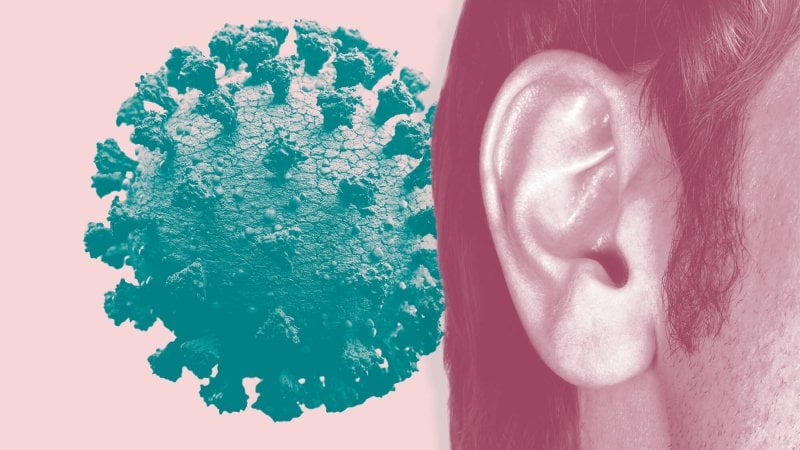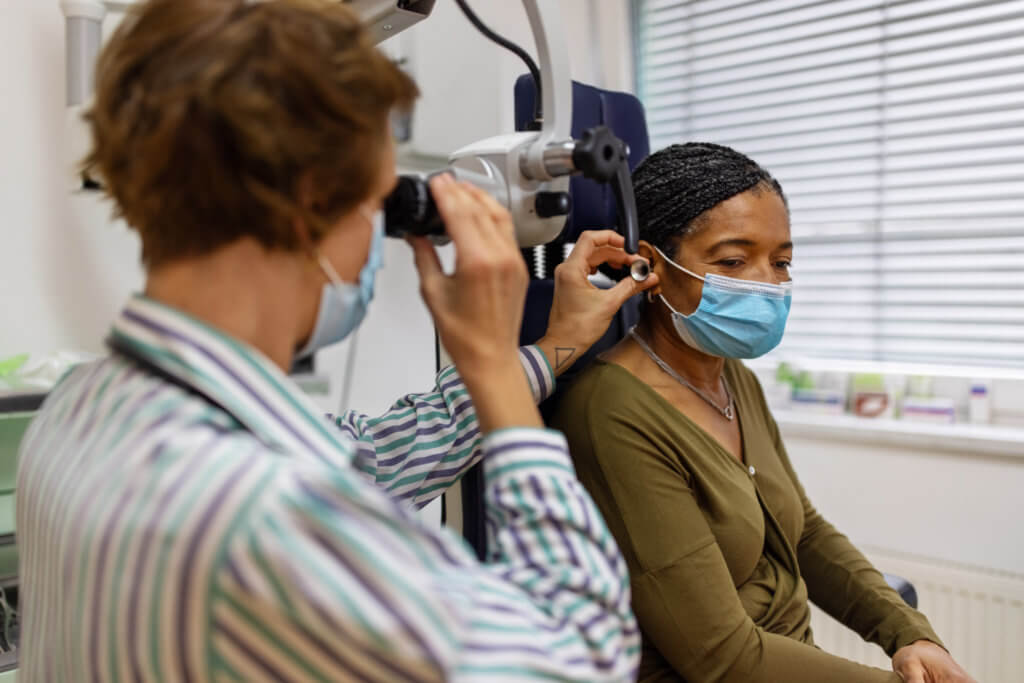This past March, the CEO and founder of the Texas Roadhouse steakhouse chain, Kent Taylor, committed suicide. According to family and friends, he had no history of depression. But there was an exacerbating factor — Taylor, after recovering from a bout with COVID-19, suffered from severe tinnitus, an internal ringing sound in your ears. It’s a mysterious disorder that plagues tens of millions of Americans and many more worldwide.
His doctors do not know for sure, but the timing points to a possible link with COVID-19. After recovering from a mild case of the coronavirus last November, Taylor developed the tell-tale persistent ringing in his ears. It became so distracting that he had trouble reading or concentrating, and gradually grew worse. He was unable to sleep more than two hours a night.

In early March, Kent met friends at his home in Naples, Florida, and led them on a yacht cruise in the Bahamas. They hoped he was finally getting better. Then his tinnitus “came screaming back in his head,” said Steve Ortiz, a longtime friend and former colleague. Soon after he committed suicide.
“Stress can dramatically increase Tinnitus distress, and the pressure Mr. Taylor must have felt due to the COVID pandemic must have been immense,” said John Hoglund, a hearing instrument specialist and Founder of Hoglund Family Hearing and Audiology Center, in an email. Nearly 1 in 5 people who got COVID-19 was diagnosed within three months with a psychiatric disorder such as anxiety, depression or insomnia, and many were linked to tinnitus.
Taylor’s case is not an anomaly. Thousands of cases of tinnitus have been linked to either COVID or the vaccines, although there is no hard proof, at this juncture, of anything more than association. Within a few hours of receiving his second COVID-19 mRNA vaccine dose in February, Gregory A. Poland, MD, a vaccinologist and director of the vaccine research group at the Mayo Clinic, knew something was not right. His ears started ringing relentlessly. He’s now one of thousands of people who have developed the condition following COVID-19 vaccination. According to a Facebook chat, many developed it within a day of receiving the vaccine.
Late in October 2020, Paula Wheeler, who lives in central Kentucky, came down with a severe case of COVID-19 — high fever, pneumonia, and time in the hospital, and week after week of rolling symptoms. Within a few months, she developed tinnitus.
The ringing in her ears is a bit like the buzz of an old-time TV, Wheeler says. It’s unrelenting. “I’ve got that in my head in both ears all the time.
Taylor and Wheeler aren’t alone in experiencing tinnitus after recovering from COVID-19 or in some cases getting a shot. The sheer volume of newly reported cases is concerning. In a systematic review of hearing-related symptoms post-coronavirus, nearly 15 percent of patients reported tinnitus, although it’s worth noting that this figure may be an overestimate, per the study authors. As of May, the U.S. Vaccine Adverse Event Reporting System (VAERS) database had documented 1,486 cases of tinnitus following vaccination with any brand, meaning 0.95% of vaccine recipients reported experiencing the potential side effect.
Widespread effects
Although it affects as many as 50 million Americans, according to the American Tinnitus Association, it is a chronic condition that we rarely hear about in the mainstream press. The list of sufferers is not fully documented, as many people don’t openly share about their conditions.
Many notable individuals besides Taylor have experienced tinnitus, including well known stars such as Whoopi Goldberg, William Shatner, and David Letterman.
Shatner’s tinnitus began while he was filming the 1967 Star Trek episode Arena. “I was standing too close to a special effects explosion and it resulted in tinnitus. There were days when I didn’t know how I would survive the agony. I was so tormented by the screeching in my head I really thought I would not be able to go on!” he describes.

Exposure to high volumes of sound often causes both hearing loss and tinnitus. Regular exposure to noises of any sort can contribute, especially working in a field with machinery running for hours each day.
The rock band The Who, which has a Guinness World Record for the loudest concert ever recorded, had to stop touring because lead guitarist Pete Townshend developed severe tinnitus. Ozzy Osbourne, Neil Young, and Eric Clapton have also spoken out about how music has damaged their hearing and left them with challenging tinnitus problems.

Military personnel are especially vulnerable. Tinnitus is the number one disability affecting veterans, impacting almost 2 million service members on disability. A large part of the National Center for Rehabilitative Auditory Research is dedicated to researching treatments and providing tinnitus education for veterans. “When you’re around aircraft generating 110-150 decibels, it’s a lot of background noise when working 15 hour days on deployment,” says Jean-Claude Wicks, a former U.S. Air Force Staff Sergeant in a video interview.
But as Kent Taylor’s case illustrates, an increasing number of cases are not linked to loud noises, but to other, often unexplained, causes. It’s debilitating for many. Some 45% of tinnitus patients experience anxiety and 33% have major depression. In a large recent Swedish study, some 5-9% of patients with severe tinnitus attempted suicide. The added complication of a global pandemic adds to the suffering for many victims. Having symptoms of COVID-19 exacerbated existing tinnitus in 40% of respondents in another recent study.
What causes tinnitus?
Humans have a long history of suffering from tinnitus. The condition has been documented as early as 1600 BCE, in the Egyptian medical manuscript Papyrus Ebers, where it was called “bewitched ear.” It’s likely that the condition preceded this early record.

Over the years, proposed treatments from a wide spectrum of research have not shown much efficacy, likely because of the diverse etiology and heterogeneity of the condition. The most common perception is a persistent high-pitched ringing sound in one or both ears that others cannot hear, although tinnitus can manifest differently for different people.
Common iterations experienced are buzzing, frying, hissing, ringing, or even whistling sounds. These phantom noises may be intermittent or continuous. Interestingly, the lexicon used to describe the sounds of tinnitus may vary by geography and the demographic background of the patient, according to tinnitus practitioners from around the country.
Tinnitus is not classified as a disease, but rather a symptom of one or more underlying conditions. The conditions often originates from a damaged inner ear, but the actual sound perception is generated within the brain itself. Therefore, tinnitus is very much a neurological disorder, making it complicated to treat.
Tinnitus can also be caused by age-related hearing loss, vascular and circulation issues, cervical-spinal issues, certain audio vestibular issues such as Meniere’s Syndrome, or most often — exposure to loud noises. This is a Ted Talk by East Tennessee State University audiologist Marc Fagelson about tinnitus:
Comprehensive research on tinnitus began in the middle of the last century, but little was known about the condition, often prompting radical attempted cures. One clinician, Dr. Doug Lewis, recounts that in the early 1980s, a patient with unbearable tinnitus in one ear asked that his auditory pathway be severed for that ear, or he would commit suicide. This involved a complete resection of the acoustic or 8th cranial nerve. The operation was a success (the tinnitus disappeared), but this is very much an outlier case, and it resulted in the complete and permanent loss of hearing in that ear.
Treatment and diagnosis are often a roundabout affair. When a patient first notices the telltale signs of tinnitus, they typically see a local ENT, who looks for potential physical issues inside the ears. The next step is to see an audiologist, who tests the patient for hearing loss and the presence of tinnitus (they often occur together). These specialists can recommend various retraining therapies, cognitive behavioral therapies to reduce the emotional impact of tinnitus, or specialized hearing aids (with built-in tinnitus masking). But at this time, there is no scientifically proven cure for the underlying causes of tinnitus.
Where can people go for help?
Even without a reliable cure, resources from regional centers of excellence can help provide relief to suffering patients. For example, the Cleveland Clinic’s Tinnitus Management Clinic approaches tinnitus with a multidisciplinary team of audiologists, neurologists, dentists, and psychologists. This is an excellent approach, as the source of tinnitus can originate in different areas of the body connected to the auditory pathway. And treating the source of the issue may often provide relief from tinnitus symptoms.
“There are several counseling and sounds therapy approaches which can be helpful with the reactions to the tinnitus…because the origins of tinnitus are so multivariate, study designs must identify the proper subgroups for analysis,” said Dr. Richard Tyler, a world-leading tinnitus researcher at the University of Iowa.
One method of research is to focus on treatments for specific causes of tinnitus, such as noise-induced hearing loss. Another approach to finding relevant subgroups includes a statistical technique referred to as cluster analysis. This identifies homogeneous subgroups from a common set of variables without making presumptions on which variables are the most important. The cluster analysis methodology helps to facilitate properly designed clinical trials with well-defined criteria and meaningful primary and secondary endpoints, used to indicate trial success or failure.
Promising research into tinnitus may also come from “Learning Health Networks” (LHNs), a relatively new framework which brings patients, doctors, clinicians and researchers together to collaborate more effectively. This framework was originally developed for kids with chronic conditions at the James M Anderson Center for Health Systems Excellence, at Cincinnati Children’s hospital. Due to their early growth and success, the LHN framework is now being scaled to work with adults with chronic conditions, including tinnitus.
False cures and false hopes
A plethora of snake oil salesmen have taken advantage of the lack of a cure for tinnitus, promoting unproven therapies and dubious cures. Such “experts” tend to show up on the Internet, where people with newly diagnosed tinnitus may begin their search for treatments, such as Facebook tinnitus support groups and the Reddit tinnitus community. Unrealistically raising false hopes doesn’t pass muster on ethical terms, and unproven treatments can potentially hurt patients even further.
Some unproven therapies include antibiotics, antidepressants, over-the-counter pain medications like Advil and aspirin, cancer drugs, and even diuretics. Higher doses of these medications demonstrate a greater chance of medical problems arising. Additionally, both high sodium and caffeine can make tinnitus symptoms worse.
Two products frequently included in Google search results (no doubt due to effective SEO marketing techniques) are “Tinnitus 911” and “SILENCIL”. Both companies claim that tinnitus is a result of “inflammation in the brain,” and that their cocktail of supplements calms inflammation and therefore reduces or eliminates tinnitus. None of this has ever been proven in clinical studies for Tinnitus 911, according to the British Tinnitus Association. Many user reviews for these products can be linked back to the companies.

SILENCIL goes a step further by paying for advertisements that appear like legitimate science-based review articles, engaging in unethical marketing techniques. Research shows how creative these scammers are at stealing time and money from desperate tinnitus sufferers. An overwhelming number of buyers at Amazon report negative or no results. One reviewer reports: “I have taken this for the 30-day period and have not seen any decrease in my tinnitus. In fact, it seems worse!”

Most physicians steer away from untested therapies. In a recent survey in the American Journal of Audiology, 71% of participants found the supplements ineffective. Improvement in tinnitus was reported by 19% of patients, with 10% responding that a supplement actually had negative effects. The survey results confirm dietary supplements’ lack of efficacy for tinnitus and correlate with findings of previous studies, according to long-time tinnitus researcher, Dr. Claudia Barros Coelho.
Unfortunately, the market is flooded with unproven (and expensive) “cures.” Astrophysicist Carl Sagan once said something both simple and profound: “Extraordinary claims require extraordinary proof.” Sharp critical thinking techniques are your strongest defense against misinformation concerning tinnitus and other hearing issues — at least until social media platforms more rigorously separate information from misinformation. In all cases, you should consult a qualified tinnitus practitioner before buying any of these expensive dubious supplements and products for tinnitus.
The COVID factor
For many people with tinnitus, anxiety about catching COVID exacerbates existing symptoms. Rebecca Edgar, 29, has difficulty hearing her toddler when he talks to her from the backseat of her car. Most nights, she struggles to fall asleep, caught in a cycle of worry that the ringing in her ear is getting louder and recognizing that this stress is worsening her tinnitus symptoms.
“I’ve had a constant high-pitched buzzing in my ear for the past 20 years, but there is no doubt that this is the worst my tinnitus has ever been,” said Edgar, of Essex County in southeast England. “I’m deaf in one ear, and I’m so scared that catching COVID-19 could destroy what’s left of my hearing.” Her fears are felt by many.
Not only can pandemic-related stress make symptoms worse, infections themselves, such as the flu and COVID-19, can cause ear inflammation. In one case study, a 45-year-old British man developed tinnitus and hearing loss in one ear after contracting a severe case of COVID-19. With the help of steroids, his condition did improve slightly.
Although the link is not clearly defined, growing anecdotal evidence suggests that COVID vaccines can spark tinnitus cases. “People who have a pre-existing condition of hearing loss are more likely affected by COVID or vaccines,” theorizes Dr. Shaowen Bao, an associate professor of neuroscience and physiology at the University of Arizona. According to Bao, peripheral cytokines — protein messengers that immune cells use to communicate — from COVID-19 vaccines could cause or exacerbate tinnitus.
Other possible explanations include temporary neuroinflammation and stress and anxiety around taking the shot. The general consensus is that the great majority of people won’t develop tinnitus from vaccines. However, it is important to keep a lookout for any emerging trends, as there is no long-term data available at this time.
Mayo Clinic vaccinologist Gregory Poland, himself a tinnitus sufferer after getting COVID vaccines, has speculated on what the vaccines have in common that could touch off or exacerbate the ear ringing.

“The most generous explanation is that these are highly immunogenic vaccines, and they have, compared with other vaccines that we give, high reactogenicity rates,” he said. “So, my hunch is that this is an off-target inflammatory response. … My second hunch is that over time, these off-target inflammatory responses will either disappear completely or considerably diminish over time, which raises a really important question: Do I get a third COVID-19 vaccine dose if those become recommended?”
Finding a cure
Tinnitus research still has a long way to go, and scientists will need to pursue many different paths for potential cures. In the meantime, tinnitus sufferers should only seek professional help from reputable sources (ENTs, doctors, audiologists, therapists), and view all online “miracle cures” with extreme suspicion. While there are therapies which can help relieve the symptoms of tinnitus, there is currently is no silver bullet cure for the underlying pathophysiology. We can only manage the symptoms of tinnitus at this time.
Kent Taylor realized how essential evidence-based, scientific research is. Taylor was a retired US army sergeant. Before his death, he funded a clinical study to help members of the military who suffer from the condition.
“In true Kent fashion, he always found a silver lining to help others,” his family said in a posting.
Taylor was a team player in all aspects of life, and it will take a team-oriented approach to ultimately tackle tinnitus and bring relief to the many millions who desperately need it. It is a world-wide chronic condition of pandemic proportions.
Jeffery Reagan is a tinnitus research advocate and freelance writer. A tinnitus sufferer himself, he believes that finding better therapies and ultimately discovering a cure for tinnitus rests with evidenced-based scientific research and well-designed clinical trials — with an emphasis on patient participation in a learning health network model. Mr. Reagan holds a degree in information technology from the University of Cincinnati and his IT career has spanned 5 decades, with a focus on data modeling and analytics. He has set up a support group and information resource, Stop the Ring and can be reached at [email protected].
This article previously appeared on the GLP on July 20, 2021.

































